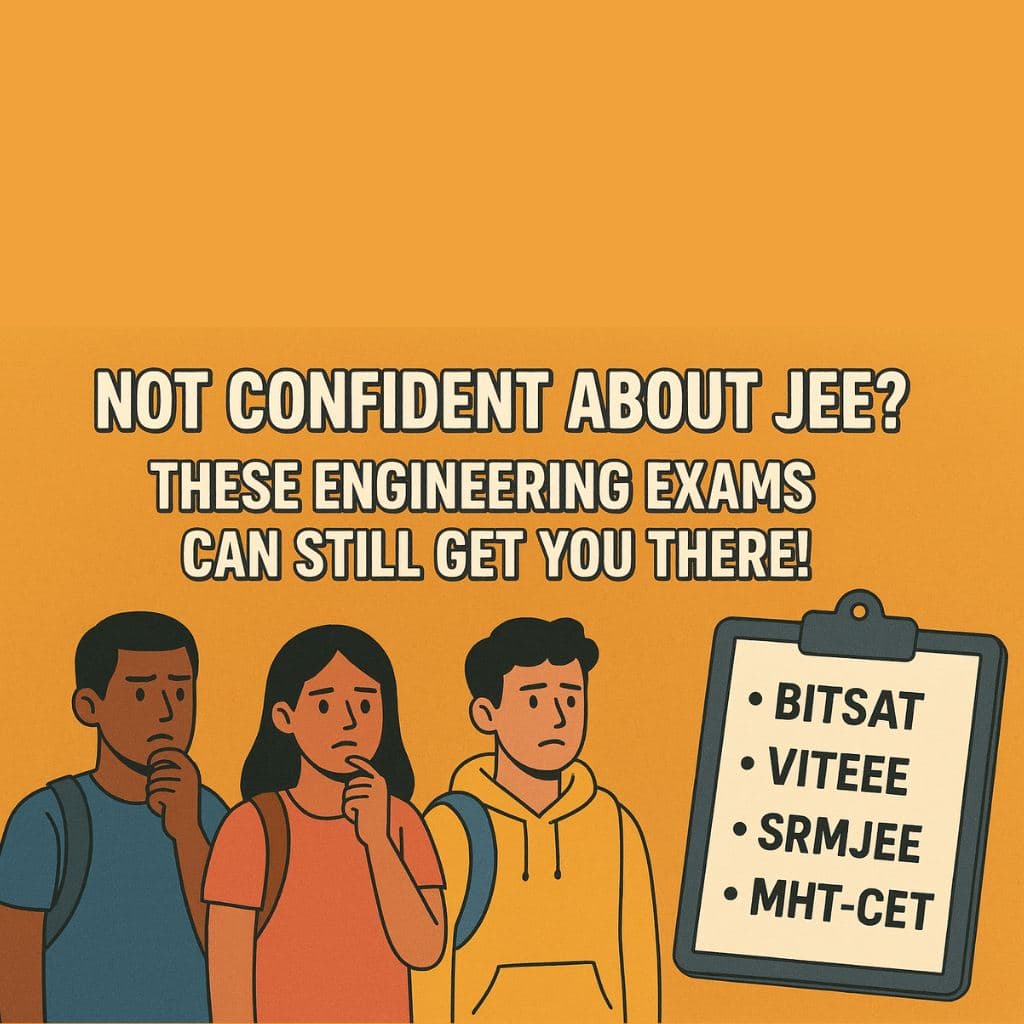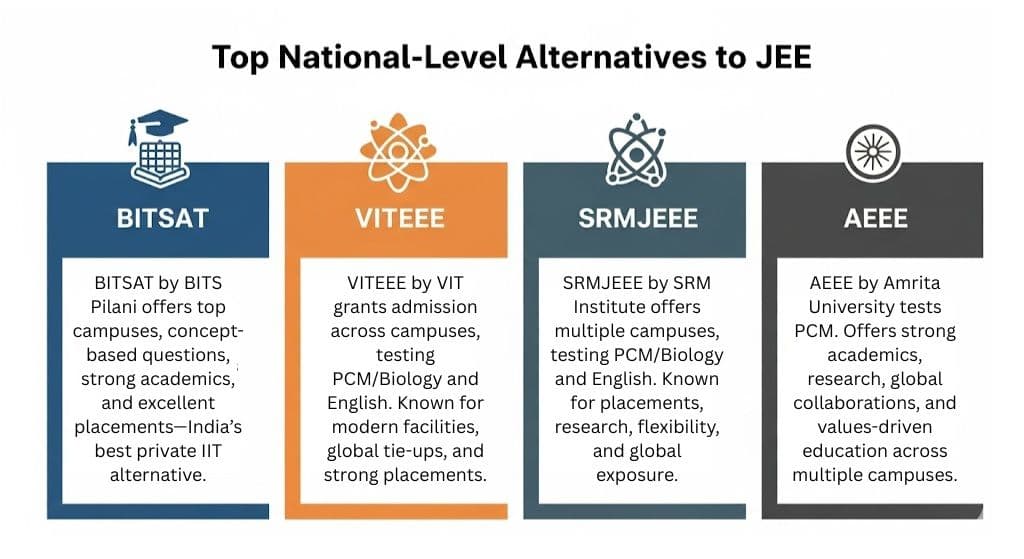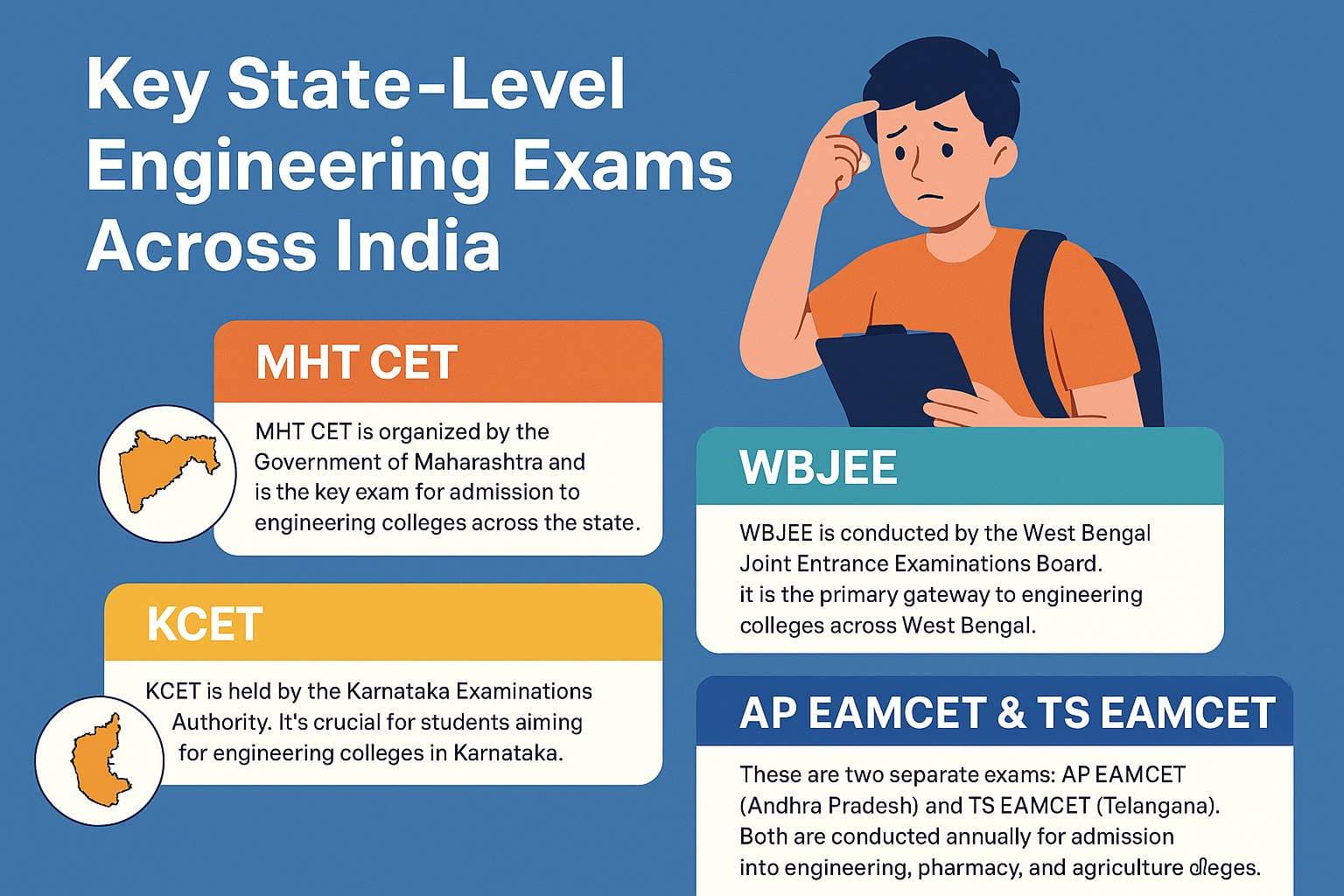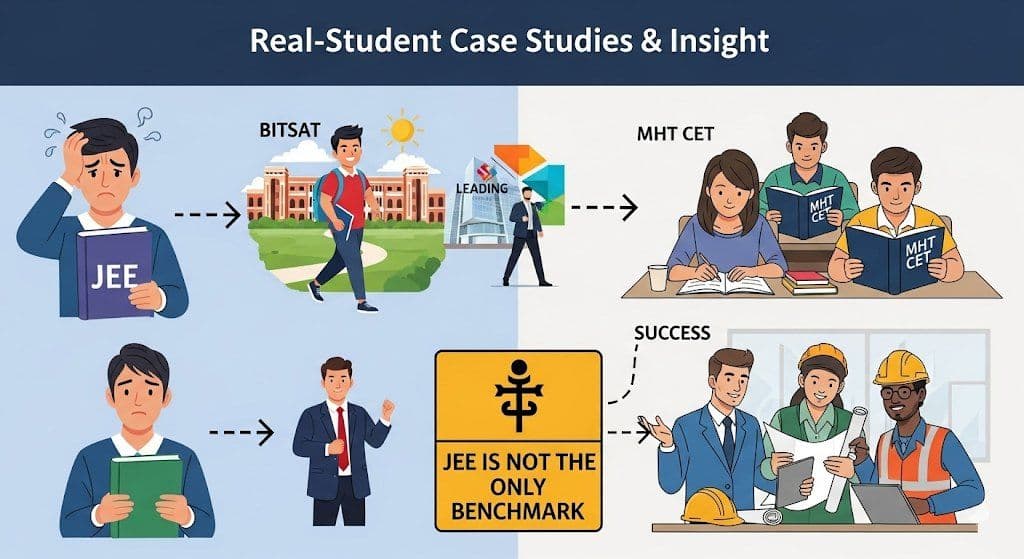Not Confident About JEE? These Engineering Exams Can Still Get You There!
Pratham Jiwnani
9/18/2025

If preparing for JEE (Joint Entrance Examination) feels like a mountain you can’t climb, you’re not alone. Thousands of students go through the same worry every year. The truth is, JEE is one way to enter engineering—but it isn’t the only way. India has many respected entrance exams, both national and state-level, that can still help you reach strong engineering colleges and rewarding careers.
Why JEE Doesn’t Define Your Engineering Future
JEE is tough, no question. But your engineering journey doesn’t start and end with this one exam. Many engineers who never made it to IITs or NITs have gone on to top companies, research labs, or even launched their own startups. Other exams exist to give you more than one shot, and they’re designed to test the same skills—just in a different format.
Top National-Level Alternatives to JEE

BITSAT (Birla Institute of Technology and Science Admission Test)
BITSAT is one of the most popular alternatives to JEE. It is conducted by BITS Pilani and opens doors to its campuses in Pilani, Goa, Hyderabad, and even Dubai. The exam is known for its balanced and concept-oriented questions, testing Physics, Chemistry, Mathematics, Logical Reasoning, and English. BITS has an excellent academic reputation, world-class infrastructure, and a very strong placement record with graduates working in top tech companies and research institutions. If you want a private university with prestige comparable to IITs, BITS is worth aiming for. Official BITSAT website.
VITEEE (VIT Engineering Entrance Examination)
VITEEE is conducted by Vellore Institute of Technology, which has campuses in Vellore, Chennai, Bhopal, and Amaravati. It is one of the largest private engineering entrance exams in India, taken by lakhs of students every year. The test covers Physics, Chemistry, Mathematics or Biology, and English. VIT has strong industry connections, innovative curriculum choices, and a high placement rate in IT and core engineering. Many students prefer VIT because of its modern facilities and international tie-ups. Official VITEEE page.
SRMJEEE (SRM Joint Engineering Entrance Exam)
SRMJEEE is held by SRM Institute of Science and Technology and is accepted at its multiple campuses. The exam tests Physics, Chemistry, Mathematics/Biology, and English, much like other national exams. SRM has built a reputation for good placements, research opportunities, and exposure to international programs. It’s especially popular among students who want flexibility in choosing specializations and prefer a large, resource-rich campus environment. Official SRMJEEE page.
AEEE (Amrita Entrance Exam – Engineering)
AEEE is conducted by Amrita Vishwa Vidyapeetham and is accepted at all its campuses across India. Amrita is known for its strong academic focus, values-driven education, and collaborations with global universities. The exam is considered moderately difficult and covers Physics, Chemistry, and Mathematics. Students looking for a balanced campus life with opportunities in research, social projects, and global exposure often find Amrita a good choice. Official AEEE page.
Key State-Level Engineering Exams Across India

MHT CET (Maharashtra Common Entrance Test)
MHT CET is organized by the Government of Maharashtra and is the key exam for admission to engineering colleges across the state. The syllabus is largely based on the Maharashtra State Board curriculum, but if you’ve been preparing for JEE, you’ll find a lot of overlap, especially in Physics, Chemistry, and Mathematics.
The paper is conducted online and is known for being more application-based rather than purely conceptual, like JEE. Students who focus on speed and accuracy tend to do well here. Admission through MHT CET gives access to top government and private colleges within Maharashtra. Official MHT CET site.
WBJEE (West Bengal Joint Entrance Exam)
WBJEE is conducted by the West Bengal Joint Entrance Examinations Board. It is the primary gateway to engineering colleges across West Bengal, including top institutions like Jadavpur University and IIEST Shibpur. The exam is offline (OMR-based) and tests Physics, Chemistry, and Mathematics.
The questions are slightly less challenging than JEE but require strong fundamentals and speed, as the marking scheme often includes negative marking. If you’re serious about engineering in West Bengal, WBJEE is your best bet. Official WBJEE site.
KCET (Karnataka Common Entrance Test)
KCET is held by the Karnataka Examinations Authority. It’s crucial for students aiming for engineering colleges in Karnataka, including institutions like RVCE and BMS College of Engineering. The exam tests Physics, Chemistry, and Mathematics, and the pattern leans heavily on the state board syllabus.
Since it is specific to Karnataka, it favors students familiar with the state curriculum, but JEE aspirants also find it manageable with targeted practice. KCET results carry weight not just for engineering but also for pharmacy and agriculture courses. Official KCET site.
AP EAMCET & TS EAMCET
These are two separate exams: AP EAMCET (Andhra Pradesh) and TS EAMCET (Telangana). Both are conducted annually for admission into engineering, pharmacy, and agriculture colleges in their respective states. The exam focuses mainly on the state board syllabus of classes 11 and 12, but JEE preparation gives you a solid edge. It’s a computer-based test that prioritizes speed, accuracy, and time management. Top state universities and private colleges use these scores for admission. AP EAMCET site, TS EAMCET site.
Real-Student Case Studies & Insight (Inspiration, Not Pressure)

Think about a student who struggled with JEE but decided to prepare seriously for BITSAT. With steady practice and focus, they earned a seat at BITS Goa, where the environment, faculty, and peer group helped them develop into confident engineers.
Today, they work at a leading MNC, proving that one exam does not define potential. In another case, students from Maharashtra relied on the MHT CET to gain admission to prestigious government and private colleges. Many of them went on to secure excellent placements and pursue higher studies. If you want to explore those options further, you can check this guide on the top colleges for MHT CET in Maharashtra. These stories show that while JEE is important, it isn’t the only benchmark for building a successful career in engineering.
FAQs About JEE Alternatives
Q1. Are exams like BITSAT or VITEEE easier than JEE?
They are usually considered less intense than JEE, but they still demand preparation and consistent practice. The competition is high because lakhs of students appear for them.
Q2. Can I prepare for these exams while studying for JEE?
Yes. The syllabus overlaps a lot, especially in Physics, Chemistry, and Mathematics. With some extra practice in English, Logical Reasoning, or state-specific topics, you can manage both.
Q3. Do state-level exams like MHT CET or WBJEE have good colleges?
Absolutely. Exams like MHT CET give access to respected government and private colleges. For example, check out this list of top colleges for MHT CET in Maharashtra.
Q4. If I don’t get into IITs or NITs, will my career be affected?
Not at all. Many successful engineers come from universities like BITS, VIT, SRM, or state universities. What matters most is your skillset, internships, and how you perform in your career journey.
Q5. How should I balance my preparation between JEE and these exams?
Treat JEE prep as your base. Then, customize your practice by solving past papers of BITSAT, VITEEE, or the state-level exam you’re targeting. This way, you’ll be ready for multiple opportunities.
Final Thoughts & Action Plan
Not cracking JEE—or even doubting your chances—doesn’t mean the end of your dream. Exams like BITSAT, VITEEE, MHT CET, WBJEE, and KCET are open doors waiting for you. What matters most is:
- Consistency in preparation.
- Practicing smart with PYQs and reliable resources.
- Using tools to study efficiently and track your chances.
Engineering is about skills, persistence, and problem-solving—not just one exam. Focus on what you can control, and your path will open up.
Categories
Join the Discussion
0 comments